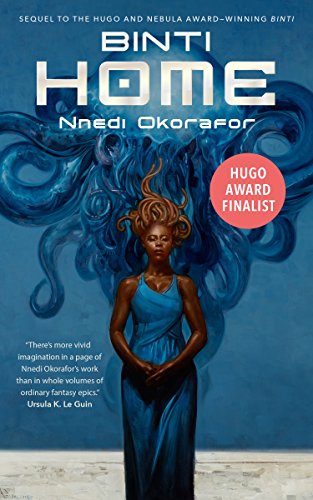This is another book that I think suffers because I read the second book in the series first, due to time constraints and wanting to get all the Hugo books and novellas, etc., read. I was initially hoping to have time to go back and read the first book before starting this one, but with the deadline fast approaching, I had to just go ahead and read Binti: Home on its own.
This was a bit difficult because by itself, Binti: Home doesn't feel like a well-rounded story. It's interesting, absolutely, and I want to know more. But it feels like a way station between whatever happened to make Binti into the human/Meduse mix she now is, and whatever happens next. It's a story of homecoming, as the title suggests, but I don't know enough about what home was to know why Binti was so eager to return, particularly since it seemed like she hadn't been away that long, and people at home were more than happy to make her glad she'd stayed away.
We start with Binti finishing what is, I think, her first semester away at an off-world university, after having suffered an attack and unexpected survival on her way to Oomza U. (I'm gleaning this, but as I said, I haven't read the first book.) She feels a sharp pull home, and brings with her a Meduse, her friend, but also one of the race who attacked and killed everyone else on the ship she was on on the way to university. She's now part Meduse, with hair that seems to move on its own. I'm not sure of the full implications of these changes, but didn't need to be to get most of the story. I think.
She returns home to go on pilgrimage, but is met with humans who are suspicious of the Meduse, both her own people and another tribe that were traditionally at war with the Meduse. (I presume this is explained more in the first book, and I feel bad that I keep having to say that, but it was true to the experience of reading this. Which is my own damn fault for reading the second book first, but sometimes that's what you have to do.)
She's also met with variations between distance and outright hostility from her family, with her sister telling her (at a party, no less, in front of everyone) how selfish she is and how she's killing their father and that she should come home, while simultaneously telling her she's a freak and doesn't belong. It feels like the very definition of toxic family dynamics, particularly the appealing to a mob in the midst of tearing one's sister down.
There's a lot here about places in a family and family dynamics, but there's so much hostility aimed at Binti, even from those who do seem to truly love her, that the command that she should stay does not have a lot of emotional weight, or maybe just not with me. I could see how it could, if we knew more about this family and the dynamics that led to this place.
Then what was the most interesting part came, near the end. Binti went out into the desert with her father's people, the people he'd been at pains to conceal most of his life, and who Binti's mother looked down on as savages. Binti had imbibed some of these attitudes, but who they are and what their society was, was fascinating, particularly the explanations for some physical habits and their history. Binti becomes something different yet again, further distancing herself from her home even as she wants to return to it.
I really hope I get a chance to read the first novella - I think there's a very good chance I'll be reading the third come Hugo season next year.

No comments:
Post a Comment